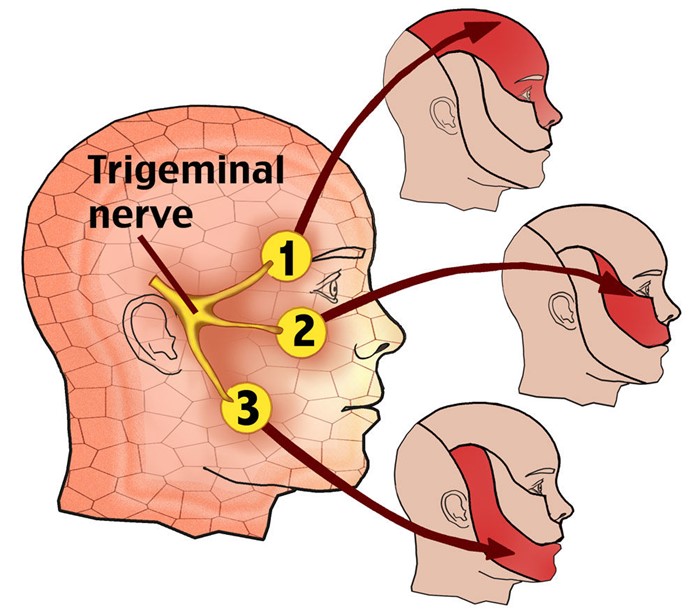A client diagnosed with trigeminal neuralgia is experiencing intermittent, sudden, severe pain on the left side of the face. The nurse identifies which classification of medications is most effective in treating this pain.
Analgesics
Antihistamines
Antibiotics
Anticonvulsants
The Correct Answer is D
Choice A reason: Analgesics are medications that relieve pain by blocking pain signals or reducing inflammation. They include nonsteroidal anti-inflammatory drugs (NSAIDs), opioids, and acetaminophen. However, analgesics are not very effective in treating trigeminal neuralgia, as they do not address the underlying cause of the pain, which is the compression or irritation of the trigeminal nerve.
Choice B reason: Antihistamines are medications that block the effects of histamine, a chemical that causes allergic reactions such as itching, sneezing, and swelling. They include diphenhydramine, cetirizine, and loratadine. Antihistamines are not effective in treating trigeminal neuralgia, as they do not affect the trigeminal nerve or its function.
Choice C reason: Antibiotics are medications that kill or inhibit the growth of bacteria that cause infections. They include penicillin, amoxicillin, and ciprofloxacin. Antibiotics are not effective in treating trigeminal neuralgia, as they do not target the trigeminal nerve or its pathology.
Choice D reason: Anticonvulsants are medications that prevent or reduce the frequency and severity of seizures by stabilizing the electrical activity of the brain. They include carbamazepine, gabapentin, and phenytoin. Anticonvulsants are the most effective medications in treating trigeminal neuralgia, as they reduce the abnormal firing of the trigeminal nerve that causes the pain. Anticonvulsants are considered the first-line therapy for trigeminal neuralgia and can provide significant relief for most clients.

Nursing Test Bank
Naxlex Comprehensive Predictor Exams
Related Questions
Correct Answer is ["C","D"]
Explanation
Choice A reason: The inability to take risks is not a quality of an effective nurse leader, as it may limit the leader's potential for growth, innovation, and improvement. Effective nurse leaders are willing to take calculated risks that are based on evidence, experience, and intuition. They are also able to learn from their mistakes and failures and use them as opportunities for development.
Choice B reason: Never consider being a follower is not a quality of an effective nurse leader, as it may indicate a lack of flexibility, collaboration, and respect for others. Effective nurse leaders are able to adapt to different situations and roles, depending on the needs and goals of the team. They are also able to recognize the strengths and contributions of their followers and empower them to achieve their full potential.
Choice C reason: The ability to set priorities is a quality of an effective nurse leader, as it helps the leader to focus on the most important and urgent tasks and goals. Effective nurse leaders are able to identify the needs and expectations of their clients, staff, and organization, and allocate their time, resources, and energy accordingly. They are also able to delegate tasks appropriately and efficiently.
Choice D reason: Integrity is a quality of an effective nurse leader, as it reflects the leader's honesty, trustworthiness, and ethical standards. Effective nurse leaders are able to act in accordance with their values and principles, and uphold the professional code of conduct. They are also able to communicate openly and transparently, and accept responsibility and accountability for their actions and decisions.
Choice E reason: Critical care certification is not a quality of an effective nurse leader, as it is not a requirement or a guarantee for leadership success. Critical care certification is a credential that demonstrates the nurse's knowledge and competence in providing care to critically ill patients. While it may enhance the nurse's clinical skills and confidence, it does not necessarily reflect the nurse's leadership skills or abilities. Effective nurse leaders can come from various backgrounds and specialties, as long as they have the necessary qualities and attributes that enable them to lead others effectively.
Correct Answer is C
Explanation
Choice A reason: Repeat dose in 1 hour for unrelieved headache. This instruction is incorrect because sumatriptan should not be taken more than twice in 24 hours. Taking too much sumatriptan can cause serious side effects, such as high blood pressure, stroke, or heart problems.
Choice B reason: Chew the tablet well before swallowing. This instruction is incorrect because sumatriptan tablets should be swallowed whole with water. Chewing the tablet may affect its absorption and effectiveness.
Choice C reason: If you experience chest pain, call your physician immediately. This instruction is correct because chest pain is a serious and potentially life-threatening side effect of sumatriptan. Chest pain may indicate a heart attack or coronary artery spasm, which require immediate medical attention.
Choice D reason: Take daily to prevent headaches. This instruction is incorrect because sumatriptan is not a preventive medication for migraines. It is only used to treat acute migraine attacks when they occur. Taking sumatriptan daily can cause rebound headaches, which are worse and more frequent than the original ones.

Whether you are a student looking to ace your exams or a practicing nurse seeking to enhance your expertise , our nursing education contents will empower you with the confidence and competence to make a difference in the lives of patients and become a respected leader in the healthcare field.
Visit Naxlex, invest in your future and unlock endless possibilities with our unparalleled nursing education contents today
Report Wrong Answer on the Current Question
Do you disagree with the answer? If yes, what is your expected answer? Explain.
Kindly be descriptive with the issue you are facing.
